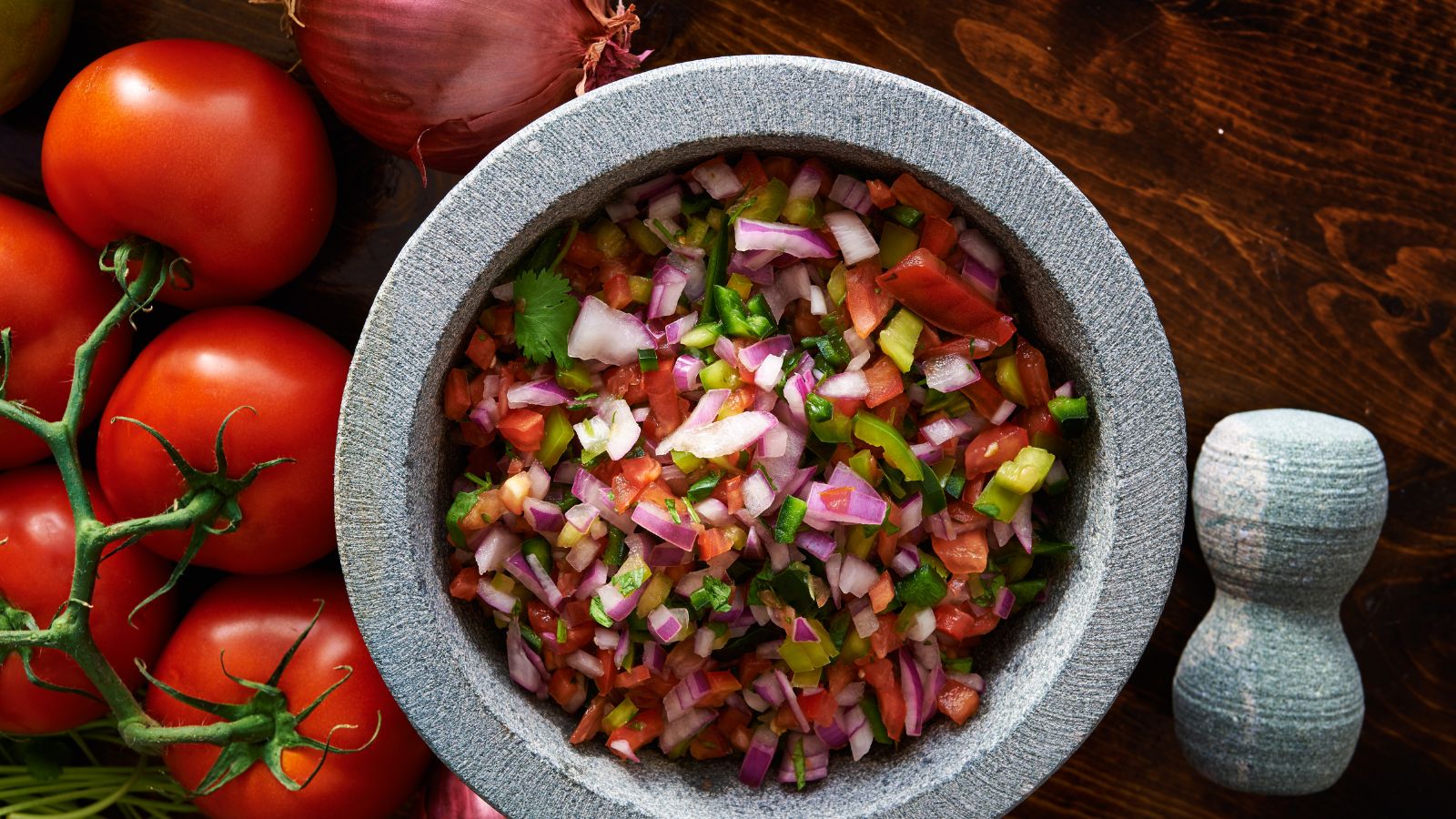
Can You Freeze Salsa? Easy Tips to Keep It Fresh and Tasty
Photo Credit: Canva Pro
You can freeze salsa, yes. Freezing salsa, whether homemade or store-bought, is a practical way to extend shelf life up to four months. However, both texture and flavor may change slightly after thawing.
Raw salsas, like pico de gallo, don’t freeze as well as cooked varieties. If you use the right containers and do the right prep, you can avoid getting watery results. This article tells you the right way to freeze salsa and how to keep its great taste.
Can You Freeze Salsa?
Photo Credit: Canva Pro
Yes, salsa tastes great even after being frozen. You can enjoy a new batch weeks later without having to waste any. If you follow these steps, you can freeze salsa made from fresh tomatoes or canned salsa. Remember that the texture will change a little when it thaws.
Yes, You Can—But Not All Salsas Are the Same
Not all salsa freezes the same way. Salsas that have been cooked, like salsa roja or verde, freeze better than salsas that are still raw, like pico de gallo.
-
Best for freezing: Cooked salsas like salsa roja or salsa verde.
-
Freeze with caution: Raw salsa and pico de gallo can get watery.
-
Homemade advantage: You control the texture and ingredients.
-
Longer shelf life: Salsa can be frozen for up to 4 months.
Why Texture and Prep Matter Before Freezing
Cherry tomatoes and other vegetables that are high in water content make fresh salsa soggy when frozen. The salsa stays better in the freezer and gets thicker when it's cooked.
-
Cook it down: Simmer on medium heat to reduce excess liquid.
-
Avoid freezer burn: Let the salsa cool before freezing.
-
Choose tomatoes wisely: Paste tomatoes work better than juicy ones.
-
Keep it thick: The less water, the better the texture after thawing
How to Freeze Salsa Without It Getting Watery?
Photo Credit: Canva Pro
If you freeze salsa the right way, it will taste better later and make less of a mess. These tips will help you keep salsa thick and tasty whether you make it yourself or buy it at the store.
Use Thickening Ingredients Like Clear Gel or Cornstarch
A lot of the time, salsas made from fresh vegetables have too much water. Adding a thickener such as Clear Jel (not cornstarch) before freezing helps retain a smoother texture. Avoid traditional cornstarch, which may break down after thawing.
-
Add tomato paste: This thickens salsa naturally and boosts flavor.
-
Use cornstarch or Clear Gel: Stir in slowly while simmering.
-
Great for big batches: Helps when you freeze homemade salsa often.
-
Cool before freezing: Avoids ice crystals from forming.
Cook Slowly and Cool Completely
Leaving your salsa to cook longer helps get rid of the water. It's just as important to let it cool all the way down—this keeps the texture and flavor in.
-
Simmer it right: Cook on medium heat for 30–60 minutes.
-
Try a slow cooker: A good hands-off option for large batches.
-
Use a food processor: Chop evenly for consistent thickness.
-
Let it rest: Cool your salsa in open air before sealing.
What Is the Best Container to Freeze Salsa In?
Photo Credit: Canva Pro
If you choose the right container, your salsa will stay safe and taste great. Choose containers that are made to be frozen to avoid leaks and broken containers.
Pick Freezer-Safe Containers or Wide-Mouth Mason Jars
Not all containers are equal. Go for ones that can handle low temps and allow room for salsa to expand.
-
Use freezer-safe containers: Choose BPA-free plastic or glass
-
Leave space at the top: About ½ inch to prevent cracking
-
Use quart sized freezer bags: Easy to label, stack, and thaw
-
Portion smartly: Smaller servings defrost faster and reduce waste.
What to Avoid When Freezing Fresh Salsa
Some containers might leak or break when they get cold. Make sure you have the right tools to keep things clean.
-
Avoid narrow jars: Glass jars with tight openings can crack.
-
Don’t overfill: Leave room for the salsa to expand.
-
Skip single-use plastics: Flimsy containers aren’t freezer-safe.
-
No reused deli tubs: They may warp or leak under freezing temps.
Can You Freeze Salsa in Ziploc Bags?
Photo Credit: Canva Pro
Yes, putting salsa in Ziploc bags to freeze is a smart way to save space. Whether you're storing salsa verde, pico de gallo, or a big batch of your own salsa, quart-sized bags make it easy and clean. Just make sure the salsa is thick and cool before you seal it.
Why Ziploc Bags Are a Freezer-Friendly Choice
Freezer bags are great for keeping salsa fresh because they are simple to store and quick to thaw. They save freezer space and work well for all kinds of salsa.
-
Easy to stack: Quart sized bags lie flat and stack neatly in the freezer.
-
Simple to portion: Perfect for dividing salsa into single-use servings.
-
Quick to thaw: Defrost evenly when placed in the refrigerator overnight or under running water.
-
Space-saving: Ideal for those with limited freezer space.
How to Pack and Defrost Salsa Properly
If you freeze your salsa the right way, it won't get soggy. Make sure there isn't too much water in the bag and that it has room to expand.
-
Leave space at the top: Don't overfill—leave ½ inch for expansion.
-
Cool first: Let your bowl of salsa cool before freezing to prevent freezer burn.
-
Thaw slowly: Place frozen bags in the refrigerator overnight for best results.
-
Ready to serve: Once thawed, add salsa to tacos, rice bowls, or enjoy with tortilla chips.
Does Vinegar Preserve Salsa?
Vinegar increases acidity and enhances flavor but is essential mainly for canning—not required for freezer storage. Adding vinegar to salsa that is going to be canned is necessary, but it can also make freezer salsa last longer and taste better, especially if you use canned tomatoes, chili peppers, and fresh vegetables.
How Acidity Helps in Preservation
For long-term storage, acid is very important. Whether it's lemon juice or vinegar, acidity helps keep bad bacteria from growing and balances out the taste.
-
Improves food safety: Essential for canning process and long-term storage.
-
Balances taste: Helps manage the spice level from hot peppers.
-
Preserves nutrients: Acidity helps slow degradation of some nutrients, but vitamin C is still sensitive to heat and freezing.
-
Use bottled acid: Stick with bottled lemon juice or vinegar for accurate acidity.
Using Vinegar in Freezer Recipes
Even if you’re not canning, adding a little vinegar or lime juice to an easy freezer salsa recipe can help reduce extra liquid and sharpen flavor.
-
Enhances flavor: Adds brightness and balances rich ingredients like olive oil and salt.
-
Helps with consistency: Reduces wateriness after thawing.
-
Optional but helpful: Especially useful for salsa verde or salsa made from canned tomatoes.
-
Pairs well with herbs: Complements fresh cilantro and garlic in homemade recipes.
What FullyHealthy Offers for Salsa Lovers
FullyHealthy offers salsa alternatives marketed for special diets and reduced allergen content, though users should verify ingredient lists for individual allergens. Their products offer taste and variety without the trouble of preparing or freezing. They have tomato-free salsa and tasty snacks.
Cherry Tomato-Free Salsa You Can Trust
FullyHealthy's tomato-free salsa is a great choice if you are allergic to nightshades or just want something different. It's tasty, safe, and will last for a long time.
-
KC Natural Salsa: A tomato-free blend that mimics traditional salsa taste.
-
Allergy-friendly: Made without fresh tomatoes, peppers, or common allergens.
-
Shelf-ready: No freezing, canning, or boiling water required.
-
Perfect for pairing: Serve with tortilla chips or drizzle over grilled veggies.
Salsa-Flavored Snacks and Spreads
Not wanting to cook? FullyHealthy also sells easy-to-eat snacks that are based on salsa and are ready to eat right from the box.
-
Salsa Fresca Sprouted Crisps: Crunchy and flavorful with salsa seasoning.
-
Fruit spread options: Try fig-based spreads for a sweet-and-savory twist.
-
Quick and clean: No large saucepan or excess water to deal with.
-
Great for on-the-go: Toss them in your lunch or serve at your next gathering.
Final Thoughts
One easy way to make your favorite dip last longer is to freeze salsa. These steps will help your salsa verde or pico de gallo stay fresh after you freeze them. Use a plastic container or freezer-safe bag and let it cool down before putting it away.
Freezing salsa in smaller amounts will keep the quality high and make it taste better. Freezing cuts down on waste, saves time, and keeps flavors from going bad. Even store-bought foods can be improved by freezing them correctly. This is a useful kitchen tip that can be used all year.
FAQs
Can I freeze salsa verde in a plastic container?
Yes, freeze salsa verde in a plastic container or freezer bag to help it stay fresh longer.
Is it okay to freeze pico de gallo even if it’s not the best salsa?
Yes, you can freeze pico de gallo, but it may get watery. It’s not the best salsa to freeze, but it works in small batches.
What’s an easy recipe to make salsa stay fresh after freezing?
Use cooked ingredients, freeze in smaller portions, and store in a plastic container for an easy recipe that stays fresh.
Should I freeze salsa in smaller portions even for the best salsa?
Yes, freezing smaller portions helps even the best salsa stay fresh and makes thawing quicker.
Can you use any plastic container to freeze pico de gallo or salsa verde?
Use only freezer-safe plastic containers when you freeze pico de gallo or freeze salsa verde to avoid freezer burn.

Leave a comment